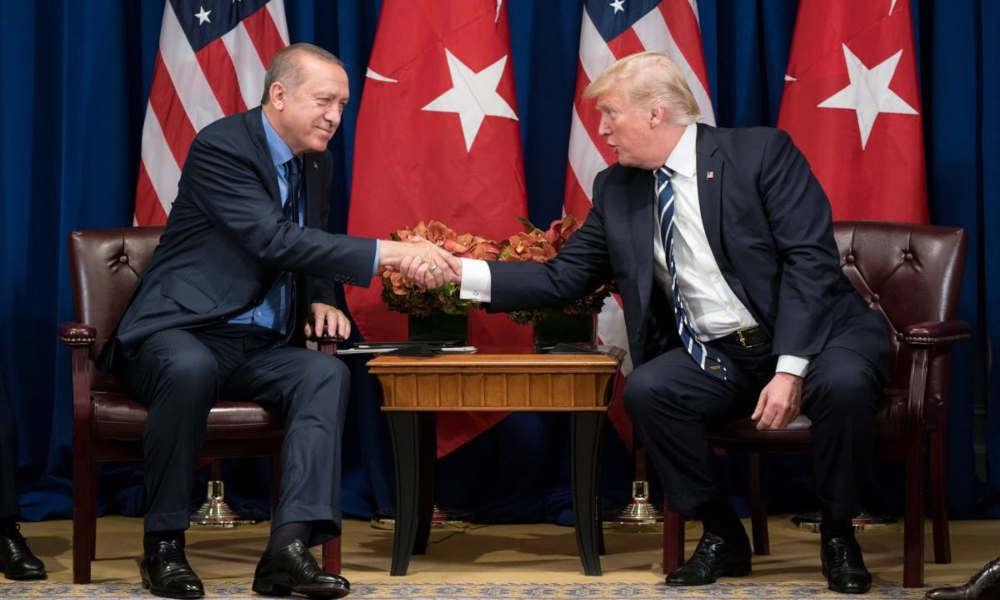![]()
1. Israel awakens to a new image of Donald Trump
Trump’s decision to withdraw U.S. forces from Northern Syria, thus leaving the Kurds, America’s allies, to fend for themselves against a massive Turkish military onslaught, shattered Trump’s image even in Israel, his last bastion of admiration. A giddy opposition was quick to criticize Prime Minister Benjamin Netanyahu for putting all his eggs in Trump’s basket; commentators who had spent the past three years defending Trump as Israel’s great savior changed their tone, and some in Israel even took to the streets in solidarity with the Kurds after their abandonment by Trump.
Does this mean that Donald Trump, the president hailed by Israeli ambassador Ron Dermer as a “true friend” and who moved the U.S. embassy to Jerusalem and recognized Israeli sovereignty over the Golan Heights, is no longer Israel’s favorite American president?
Not necessarily.
Israelis still like Trump. His gestures toward the Jewish state, although slammed by critics as empty and even dangerous, played well with the Israeli public. Decisions viewed in the foreign policy community as rash and irresponsible were perceived by Israelis as bold and trailblazing. All this will likely remain unchanged.
But Trump’s image has definitely taken a hit. His latest moves in Syria (coupled with ahistorical accusations against the Kurds, and with his expressed desire to distance America from the Middle East) have allowed skepticism about Trump’s reliability as an ally to creep into Israel’s mainstream discourse.
Why now?
First, because of the empathy Israelis feel toward the Kurdish people. Throughout decades of turbulence in the Middle East, Israelis and Kurds somehow got along. And in the aftermath of the Iraq war, relations between Israel and the Kurdish region in Northern Iraq flourished, albeit under the radar.
But more importantly, Trump’s decision to withdraw from the Syrian-Turkish border came after months of questionable policy moves that made Israelis extremely uneasy: First came his decision last December to pull 2,000 troops from Syria, potentially opening a route for further Iranian intervention. Then came his lack of response to Iran’s aggression in the Gulf and his public courting of Iran’s president Hassan Rouhani.
Jerusalem began to see a new Donald Trump: disinterested in the region and its complexities, eager to cut and run, and surprisingly willing to trade in a tough diplomatic and military posture for a handshake and a photo-op. Abandoning the Kurds in Syria was just the final straw.
2. Is Bibi Trump’s last loyal friend?
No less surprising than Trump’s decision to withdraw forces from Northern Syria, following a single phone call with Turkey’s Erdogan, was the new defiant energy this move injected in the Republican Party. After sticking with Trump as he struggled to explain the Ukrainian affair, members of his party suddenly found their voice. Florida senator Marco Rubio, who at times dared to speak out against Trump on foreign policy issues, voiced his criticism, as did former UN ambassador Nikki Haley, and even South Carolina senator Lindsey Graham, who has gone to bat for Trump on almost every occasion, sharply criticized the move, arguing it would embolden Iran and eventually endanger Israel.
Which leaves Trump with one last supporter: Benjamin Netanyahu.
The Israeli prime minister did, in fact, issue a statement expressing sympathy with the Kurds and warning Turkey against attacking them, but he stopped short of saying anything about Trump’s decision.
This may be an expression of Netanyahu’s true loyalty to Trump, or simply an acknowledgment of the fact that after tying his political future to Trump, Bibi is stuck with him, for better or worse.
3. Rudy Giuliani does Fiddler on the Roof
With all the weird twists and turns of the Ukraine affair, many details get lost. And some are actually worth noticing—for their comic value if nothing else.
Such is the case with last week’s arrest of Igor Fruman and Lev Parnas, two associates of Trump’s private lawyer Rudy Giuliani. The two were picked up as they were about to board a plane and charged with campaign finance violations.
As it turns out, the two men were also board members of Friends of Anatevka, a non-profit organization aimed at helping Jewish refugees of the military conflict in Eastern Ukraine rebuild their lives. And guess who they honored as honorary mayor of Anatevka? Rudy Giuliani. He even has a key to the city to prove it.
Does Anatevka still not ring a bell?
Well, the small town in Ukraine won international fame as the venue of Sholem Aleichem’s series of short stories Tevye the Dairyman, on which Fiddler on the Roof is based.
4. Pompeo the Christian leader
Secretary of State Mike Pompeo went out to Nashville last week to deliver a speech at the American Association of Christian Counselors. The title of his speech: “Being a Christian Leader.”
Now, no one doubts that Pompeo is a leader and that he is Christian. But for some Democrats, seeing the title on an official State Department press release was a bit too much. “He’s an American leader, who is also a practicing Christian. Him talking as a Christian leader and billing it as such is an affront to our separation of church and state,” tweeted Aaron Keyak, a former head of the National Jewish Democratic Council.
It may be relevant to note that Henry Kissinger, the only Jewish-American to hold the position of Secretary of State, never gave a speech about being a Jewish leader.
5. Checking in on the Deal of the Century
Remember that one? The Trump administration’s plan to finally bring peace to the Middle East. Whatever came of it?
Well, it is alive and well, at least according to Jason Greenblatt, Trump’s retiring special envoy on the issue. In an interview with Israel’s Arutz-7, Greenblatt promised that the plan (now downgraded to a “vision”) is “realistic and implementable,” and will be released “when the time is right.”

